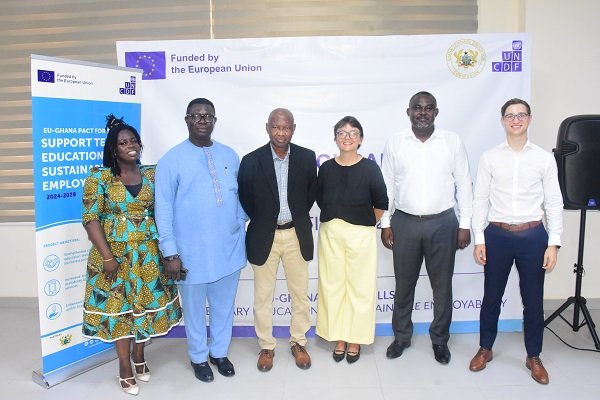‘Training young people for job market is shared responsibility’

Training young people for the job market is a shared responsibility among all stakeholders, not just universities, the Board Chairman of the Ghana Tertiary Education Commission (GTEC), Professor Mahama Duwiejua, has said.
He said industries must also play their part by opening their doors to students for practical training opportunities rather than turning them away, adding that even where trade secrets were a concern, “there are ways to give students the experience they need while protecting company information.”
Prof. Duwiejua made these remarks at the inaugural National Advisory Group (NAG) meeting in Accra on Tuesday, organised by the United Nations Capital Development Fund (UNCDF) in collaboration with GTEC and with funding support from the European Union (EU) under the EU-Ghana Pact for Skills: Support Tertiary Education for Sustainable Employability programme.
The two-day event, which was attended by stakeholders from government, academia, and industry players, focused on addressing the persistent mismatch between the skills tertiary graduates acquire and what employers require, particularly in the fast-growing green and digital sectors.
According to Prof. Duwiejua, the NAG would serve as a platform to promote dialogue, coordination, and evidence-based decision-making among partners to ensure graduates were better equipped for the job market.
“Whenever tertiary institutions hear that their graduates’ skills don’t meet industry standards, it often leads to tension. The National Advisory Group is designed to bridge that gap — to get academia, industry, and government talking together and finding common ground,” he stated.
He explained that preliminary studies had already been conducted, involving interviews with various industries to identify key skill requirements and gaps. The findings, he said, would guide GTEC in facilitating reforms that align tertiary curricula with national development priorities.
Professor Duwiejua emphasised that the challenge was not necessarily with the curriculum itself, but rather with poor coordination among stakeholders.
“This initiative will help produce graduates who not only possess technical knowledge but also have a broader understanding of employability and sustainability issues,” he added.
Senior Research Associate at Media Development Limited, the consulting firm working with UNCDF and the EU on the Skills Gap Analysis Project, Mr. Richard Freund, presented key findings from a survey of 374 medium and large firms in the Greater Accra and Ashanti Regions.
He said the research revealed low demand for advanced digital skills among firms, though the need for basic and intermediate digital competencies remained high. However, many employers still struggled to find suitably skilled candidates, with about one in five workers lacking the digital proficiency required for their roles.
Mr. Freund noted that similar gaps existed in green skills, where around four in ten workers did not possess the competencies necessary for sustainable production processes.
BY CECILIA YADA LAGBA
🔗 Follow Ghanaian Times WhatsApp Channel today. https://whatsapp.com/channel/0029VbAjG7g3gvWajUAEX12Q
🌍 Trusted News. Real Stories. Anytime, Anywhere.
✅ Join our WhatsApp Channel now! https://whatsapp.com/channel/0029VbAjG7g3gvWajUAEX12Q






